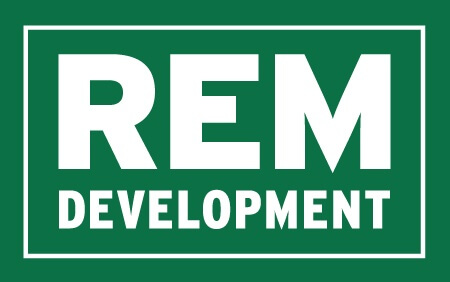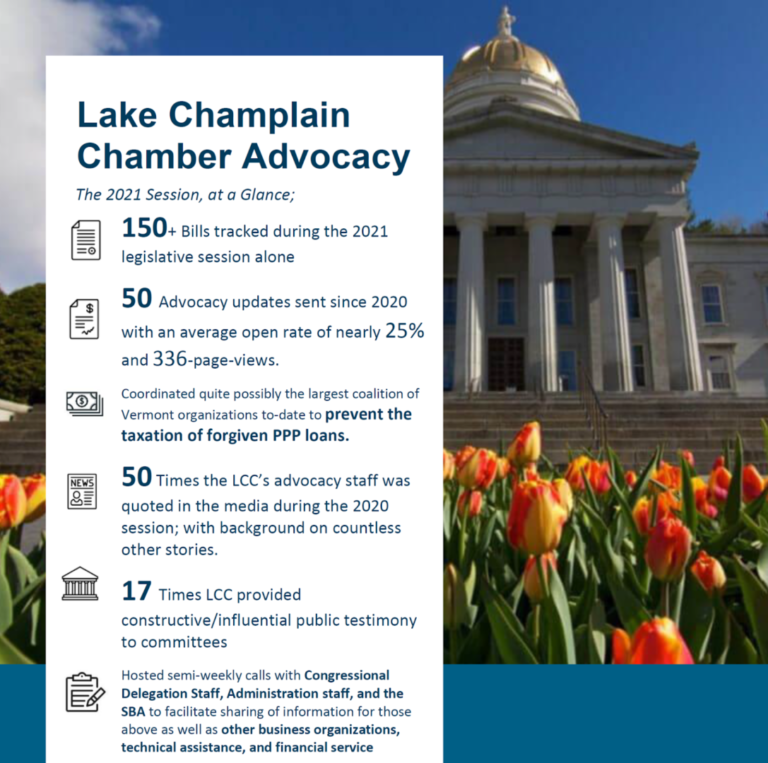Thank you to this week’s sponsor of our Advocacy Update:

LCC’s Legislative Reception is Sold Out
The Lake Champlain Chamber is pleased to announce that our Legislative Reception, Sponsored by AT&T, is sold out this year! If you are in attendance, this update – particularly the “session ahead (link)” section – is your chance to get in the headspace of the Senators who are in attendance. If you were unable to register, you can get on the waiting list by emailing [email protected] with the subject line “reception waiting list.”
Who will be there;
- Senator Virginia “Ginny” Lyons – Chair, Senate Committee on Health and Welfare; Member, Senate Committee on Education
- Senator Ann Cummings – Chair, Senate Committee on Finance; Member, Senate Committee on Health and Welfare
- Senator Randy Brock – Member, Senate Economic Development, Housing, and General Affairs; Member, Senate Committee on Finance
- Senator Dick Mazza – Chair, Senate Committee on Transportation; Member, Senate Committee on Institutions
- Senator Thomas Chittenden – Member, Senate Committee on Transportation; Clerk, Senate Committee on Education
Special thanks to the sponsor of our Legislative Reception
Join Us for Our (Virtual) Legislative Breakfast Series – Registration Now Open
We look forward to providing you access to policymakers three times between now and the end of March at our Legislative Breakfast Series Sponsored by New England Federal Credit Union! Please mark these dates in your calendar and stand by for additional details! We are still finalizing and adjusting agendas, however, look forward to connecting with our slate of policymakers, including your local legislators, the Senate Pro Tem, Speaker, Lt. Governor, and Governor.
- January 31st – 8:00 – 9:15 a.m. (virtual))
- February 14th – 8:00 – 9:15 (virtual)
- March 14th – 8:00 -9:30 (planned in-person)
Special thanks to the sponsor of our Legislative Breakfast Series:
The Session Ahead
Last week, the legislature was back in person, with many members attending virtually to get a briefing on the session ahead. We break down as many of the factors we can for you below without writing you a novel.
The big issues;
Continued Pandemic Relief
This global pandemic is taking its toll on everything. It will require the legislature to be supportive where they can while also causing no undue friction in the Vermont economy, which is already burdened. The pandemic will be approaching its second year as they begin legislating, and we’re on our second variant. Who knows what can happen…
The Vermont Bridge Grant program designed to provide relief to businesses has a great deal of funding still available that has not been allocated due to stringent and burdensome criteria. In addition, some $25 million was promised for the second tranche of funds in that program this session.
Per-Pupil Weighting Study
A legislative task force was established at the end of the last session to unravel, understand, and provide suggestions on how to improve Vermont’s incredibly complex school funding formulas. It’s an issue so needlessly complex it can bore you to tears if it doesn’t put you to sleep first. Still, it will have massive implications on the future of Vermont schools. It is becoming more and more apparent that the more urban schools, particularly those in the Chittenden County region, have the most at stake. These towns have the most diverse populations and the highest tax rates in the state. The Agency of Education published a calculator to evaluate the impact on your town.
Pension Reform Taskforce
The longstanding issue has received additional attention since the last legislative session in the form of a Pension Reform Taskforce. However, it is unclear whether that attention will result in a remedy for the issue long plaguing Vermont, driving down our credit rating.
The crux of the issue is that any solution is nestled between a rock and a hard place. On one side, Vermont’s unions and numerous union-aligned legislators repel calls to contain or reduce the benefit, say by transitioning the pension to a less expensive defined contribution plan as every other state has done. On the other side, many are unwilling to dedicate a revenue stream to pay down the unfunded liability that ballooned in part because past administrations and legislators diverted away from the employer’s contribution to other budget items.
The taskforce is supposed to deliver a plan by December 15th; however, it looks as though it will not meet that deadline. In an election year, the proverbial tin-can seems primed to be kicked down an icy Vermont country road. The big movement on this might just be resigned to seeing money put aside in last year’s budget (link) to pre-fund OPEB to make it there.
Significant, Systemic Issues; Housing, Childcare, & Workforce
The third is caused by the first two, and any conversation to remedy the third inevitably becomes a discussion over the first two.
Housing will be contingent upon legislators not letting the perfect be the enemy of the good. There are good, ubiquitously agreed-upon changes that can be made in policy, such as Act 250, which would drive more development to downtowns. This was recently called for the Climate Action Plan due to the Global Warming Solutions Act. However, it has failed to move the past three sessions due to the instance of some environmental groups that what is needed is a “balanced bill,” meaning that it would need to do things to make development harder outside of downtowns. We need a win for affordable housing and a win for the environment where we can get it, and there is no reason we see to stall these downtown provisions any longer by holding them hostage for the other conditions.
Childcare may see some movement around the margins to assist in workforce issues; however, the hefty price ticket item (hundreds of millions of dollars in funding) will be in the next legislative session in the next legislative biennium. Much of this will also likely be dependent on what happens in Washington D.C. as the Build Back Better would make massive federal investments in childcare and early childhood education.
Workforce development is a complicated topic, as we alluded to above because it is other structural deficits in Vermont that have created our workforce issues. It’s clear that the cavalry is not coming; we just don’t have enough people in the state to meet our workforce demands, we can’t easily recruit them to come here because of housing issues, we can’t pull some people back in due to childcare issues, and we do not have enough young people even coming out of school to meet our needs. Simply put, a conversation about workforce development really needs to be about how to best assist employers with the workers they do have, automate where possible, and deal with other deficits in the Vermont landscape. That said, this year may see changes in the CTE system LCC has long advocated for, and the State College’s were the subject of a summer study committee that has sought to restructure the system to meet Vermont needs.
Federal Legislation & Dollars
We all celebrated the passage of the Bipartisan Infrastructure Framework (BIF) as it will bring $2.2 billion to Vermont. These funds will have an enormous impact on Vermont’s infrastructure. Much of this funding is funneled through existing programs; however, some will need to be addressed by the legislature.
There is still about $500 million of American Rescue Plan Act (ARPA) money left for the state to allocate.
Legislators will need to wait on the potential additional funding and watershed moment that the Build Back Better human infrastructure package that the Biden Administration hopes to pass before Christmas, though cynical observers might not predict passage until close to February 18th when the current Continuing Resolution expires. We covered this package in a previous update.
Climate Action Plan and Comprehensive Energy Plan
As part of the Global Warming Solutions Act, the Climate Council delivered it’s plan to meet Vermont’s now legally binding greenhouse gas goals. The legislature was briefed that the state is not likely in danger of missing our 2025 goals, however, 2030 is looking difficult. The whole plan was dealt a blow when New England Governors backed out of the Transportation Climate Initiative.
A realist looks at these goals and sees them as unrealistic. The workforce is continually an issue in conversations of how to achieve the energy retrofits and infrastructure improvements necessary to meet the goals, and these very well paying jobs serve as evidence for the pundits pushing the simplistic policy of “just pay more” that wages are not the problem in our state’s worker deficit.
The Vermont Department of Public Service (PSD) has released the draft 2022 Comprehensive Energy Plan (CEP). The PSD seeks public comments on the draft plan until December 20, 2021.
Other issues;
There is a battle brewing over the use of $90 million in excess property tax revenue. The Governor wants to give half back; we’re sure the legislature will have other ideas.
The Lake Champlain Chamber team testified on the cloud tax, which has morphed into a tax on nearly anything you or your business does that uses the internet.
Legislative Reapportionment will be a big bear of an issue for the Government Operations Committees, which will already be faced with some problematic charter change and the outcomes of the Pension Taskforce. As we’ve previously updated, the Legislative Apportionment Board had recommended single-member districts for House seats, which is unpopular with legislators and was ignored when this process happened 10-years ago. They have since delivered Senate Districts that represent dramatic changes as well. You can find all of their work here.
Unemployment Insurance Study Committee has only released a working draft at this time, so there is not much to update since our last update. This will certainly require our team’s attention this session, so we’ve developed some tools to assist in conveying rate impact.
As we mentioned a few times already, this is an election year, and that will have numerous impacts on policy outcomes despite what anyone tells you. Things will get interesting as folks jockey for the once-in-a-decade opportunity to fill the newly opened Congressional seat and others try to adjust for new districts.
Sponsor Updates Such as This One
The content above or below is widely read and businesses tell us they find it helpful. Do you want to get in front of audiences that find this content helpful? This work is made possible, in part, by our numerous sponsors of advocacy updates and advocacy events in addition to all of our members. Please consider sponsoring our advocacy content at whatever level you can. For more information, contact [email protected].

South Burlington Land Development Regulations Need Public Comment
South Burlington is considering new Land Development Regulation that could hinder the development of new housing in the municipality, putting up barriers to economic revitalization in the region as well as the density that the Climate Action Plan calls for to mitigate the state’s greenhouse gas emissions. There will be a public hearing on these proposed regulations on January 3rd at 7:30 p.m. Due to the momentous impact these regulations will have on the region, we are asking members from all municipalities in the region to please submit comments and attend the hearing. If you have any questions, feel free to reach out to our advocacy team at [email protected].
Concerned or need to learn more about anything in this newsletter? Email our team at [email protected].
We look forward to working with you.
Sincerely,
The Lake Champlain Chamber Advocacy Team

